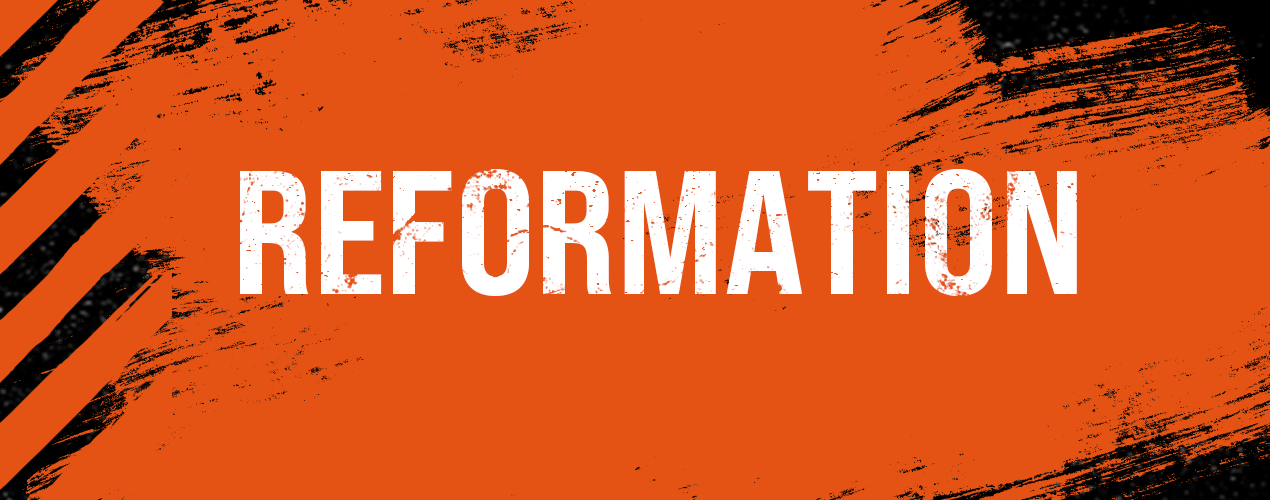Reformation Day, 2023
- By Logan Reece
- Oct 30, 2023

On October 31st, we remember America’s earliest Founding Fathers: the Reformers who rediscovered the Biblical groundwork for free society.
We are often told that the Founding Fathers of America's War for Independence hardly believed in God—that they were all Deists or were secular in thought. While some of them may have been this way, this does not reflect the society in which they lived. Reformed Puritanism was dominant across the American colonies. And it was that Reformation-based thought that motivated the Americans to fight in 1776.
Thanks to the Reformation, representative governments began to replace the top-down tyranny imposed in Medieval Feudalism by the Roman Catholic Papacy. In our day, the doctrines espoused in the Reformation hold as much relevance as in any age.
While glimpses of the Protestant movement exist in every century, it was on October 31st, 1517 that a marked change took place. On that day, Martin Luther and his 95 Theses sparked the controversy that God’s captive people needed. Luther wrote the Theses as an objection to the Papacy’s new practice of selling indulgences and promising forgiveness through them. He wrote:
“Any truly repentant Christian has a right to full remission of penalty and guilt, even without indulgence letters.” - Thesis No. 36
In hindsight, the indulgences issue was just a small part of what the Protestant Reformation would stand against. However, the document’s appeal to Scripture as a standard above the Papacy gave an example appeal that future debates would model after.
The 95 Theses quickly spread to a wide audience. The attention this created would set Martin Luther on a path of continued separation from the Papacy. This institution had kept the people of God in captivity for hundreds of years with its anti-Scriptural tyranny.
John Calvin, a Frenchman who spent much of his life in Geneva, would start to formulate the systematic theology that gave the Reformation its intensely grounded intellectual framework. He made a lasting impression with his Institutes and his commentaries on nearly the entire Bible, where he sought God’s instruction on all matters. Calvin’s work, especially, is recognized by historians as the beginning of that Christian branch of thought that would give America its strength.
Blood was shed for Christians’ freedom to engage in true religion. The French Huguenots, for instance, defended their existence against the Papists in several wars. They won many battles. They also lost many lives.
In this context of government resistance, Protestants started to discuss rightful government more deeply. The book Vindiciae Contra Tyrannos (A Defense of Liberty Against Tyrants), penned by a French Huguenot under the pseudonym Junius Brutus, is a highlight of this study. Much of our modern understanding of representative government comes from his arguments.
“Now, since the people choose and establish their kings, it follows that the whole body of the people is above the king. This is because he who is established by another is under that person, and he who receives his authority from another is less than the person from whom he derives his power.” - Junius Brutus
Ultimately, the aim of the book is to show how it is the duty of a people to organize and resist tyranny, and to follow that tenet given in Acts 5:29:
“But Peter and the other apostles answered and said: ‘We ought to obey God rather than men.’”
God's Word tells us what bad government looks like. 1st Samuel 8 lists the evils of an earthly king—such as taxing exorbitantly and drafting your children for public service—that would make the people under him cry for God’s mercy.
God’s Word tells us what good government looks like. Romans 13 gives the purpose of government—to punish evildoers—and states that this purpose is the reason God has given government the power of the sword.
Some Christians think it is never right to resist government. This is preposterous. Government is not God, and not all government action is representative of the authority of God. Paul in Romans 13 makes it clear that government is legitimate when it follows its purpose to punish evildoers. Its overreach beyond that purpose is inherently illegitimate and warrants resistance.
The freedom enjoyed in America is often attributed to the Founding Fathers and the Constitution they created. However, the Founding Fathers owe their understanding of freedom to the Reformers. For example, John Locke’s “natural law,” which heavily influenced the Declaration of Independence, is a concept derived from Samuel Rutherford’s Bible-based work “Lex, Rex.”
Our freedom exists so we can do righteousness: we ought to obey God rather than men.
On October 31, 1517, the Protestant Reformation began with an appeal to Heaven above man: Luther's 95 Theses, which argued that the Papacy had wrongfully grabbed authority not granted to it by God.
That bold act opened a floodgate of challenges to the powers of the world which had risen up against King Jesus. The Protestants sought to return to the ancient paths found in Scripture.
Across Europe, this Reformation led to Protestants being persecuted and murdered, but it also led to freedom and righteousness in some places.
Are we ready to follow in the Reformers’ footsteps?
“The condition upon which God hath given liberty to man is eternal vigilance; which condition if he break, servitude is at once the consequence of his crime and the punishment of his guilt.” - John Philpot Curran










